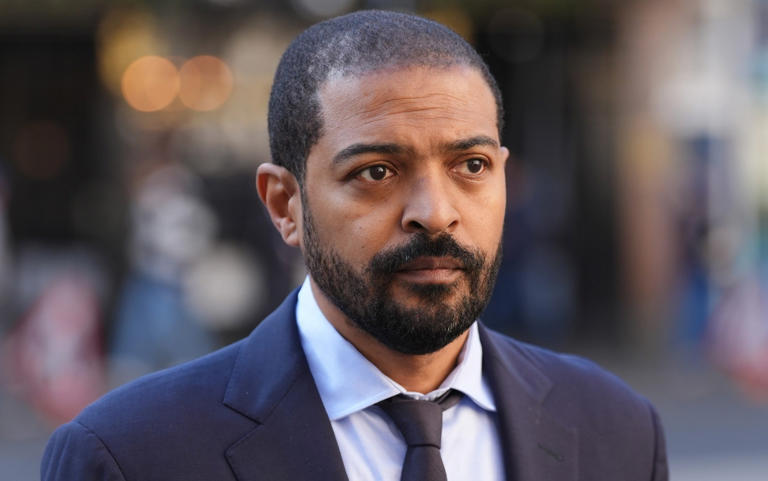Noel Clarke, the former Doctor Who actor, has lost a High Court libel claim in a victory for investigative journalism.
The 49-year-old sued the publisher of the Guardian newspaper over seven articles and a podcast, including a feature in April 2021 that said 20 women who knew him professionally had come forward with allegations of misconduct.

Clarke denied the claims, while Guardian News and Media (GNM) defended its reporting as being both true and in the public interest.
Mrs Justice Steyn agreed, dismissing Clarke’s claim in a judgment on Friday, saying that the newspaper “succeeded in establishing both truth and public interest defences to the libel claim”.
She added: “I have accepted some of Mr Clarke’s evidence… but overall I find that he was not a credible or reliable witness.”
It was a rare case of such a legal dispute going to trial in the UK and a victory for the actor would potentially have had a chilling effect on future reporting across the media industry.
The High Court heard evidence from multiple witnesses who made accusations against Clarke, including that he had allegedly shared nude photographs of them without their consent, groped them, and asked them to look at him when he was exposed.


However, barristers for Clarke told the court there was a conspiracy of people with financial and personal grudges against him who engineered his downfall because they could not bear to see him receive a Bafta award.
Philip Williams, representing the actor, said that his client was a “casualty” of a media “purge” following the emergence of the MeToo movement.
‘No conspiracy to lie’
Gavin Millar KC, for GNM, said there was “not a shred of evidence” to support Clarke’s claim of a conspiracy, describing it as “nonsensical and rather desperate speculation”.
In her written judgment, Mrs Justice Steyn said: “Mr Clarke’s case that there is an unlawful means conspiracy against him, in which many of the witnesses, and some non-witnesses, are said to have engaged, was born of necessity, in the face of the large body of witnesses giving evidence against him.
“It lacked any proper foundation and led to numerous witnesses being asked speculative questions as to their connections, without a case being put that they conspired and colluded to invent allegations – or any evidential basis on which such a case could have been put.
“I have accepted some of Mr Clarke’s evidence, as I explain below, but overall I find that he was not a credible or reliable witness.”
Dismissing Clarke’s libel claim, the judge said there was “no conspiracy to lie” by witnesses who gave evidence against him at trial.
“In the absence of a conspiracy, Mr Clarke’s case that more than 20 witnesses, none of whom are parties or have a stake in this case, as he does, have come to court to lie is inherently implausible.”
She continued that it was “clear that women have been speaking about their experiences of working with Mr Clarke for many years”.
She said that Bafta’s announcement in March 2021 that Clarke would receive an award for outstanding contribution to cinema “triggered those who were concerned about his behaviour to act, out of concern that it would enhance his power within the industry and so enable him to continue misbehaving”.
“There has been much reference to an ‘anonymous email campaign’ making false allegations against Mr Clarke,” the judge said.
“If there was such a ‘campaign’, and it seems Bafta may have received some vitriolic anonymous emails, it was not something to which any of the witnesses were party.
“One or two of them wrote anonymously to Bafta, but the matters they raised were true.”
Clarke’s barristers said their client was a ‘casualty’ of a media ‘purge’ following the emergence of the MeToo movement – Jordan Pettitt
Katharine Viner, the Guardian’s editor-in-chief, said its libel victory was a landmark for investigative journalism.
“We welcome the decision of the High Court today, in a judgment handed down by Mrs Justice Steyn in the case of Noel Clarke vs Guardian News and Media”, she said.
“The judge ruled, in extremely clear language, that the Guardian’s reporting was substantially true, and our belief that the reporting was in the public interest was undoubtedly reasonable.
“This judgment is a deserved victory for those women who suffered because of the behaviour of Noel Clarke. Going to court is difficult and stressful, yet more than 20 women agreed to testify in the High Court, refusing to be bullied or intimidated.
“This is also a landmark judgment for Guardian journalism, and for investigative journalism in Britain. It was important to fight this case.
“This was a deeply researched investigation by some of the Guardian’s best reporters, who worked diligently and responsibly. The judgment is clear that our investigation was thorough and fair, a template for public interest journalism.
“I hope today will give encouragement to other women in similar situations who have been too fearful to raise their voices for fear of the consequences.”
Owen Meredith, chief executive of the News Media Association, said: “The High Court’s ruling in favour of the Guardian is welcome and affirms the importance of rigorous investigative journalism in holding power to account.
“The judgment recognises the substantial truth of the Guardian’s reporting and underlines the vital role a free press plays in bringing serious allegations into the public domain.
“In an environment where speaking out can carry immense personal risk, this judgement marks a significant victory not only for those who came forward but for press freedom in the UK.”

